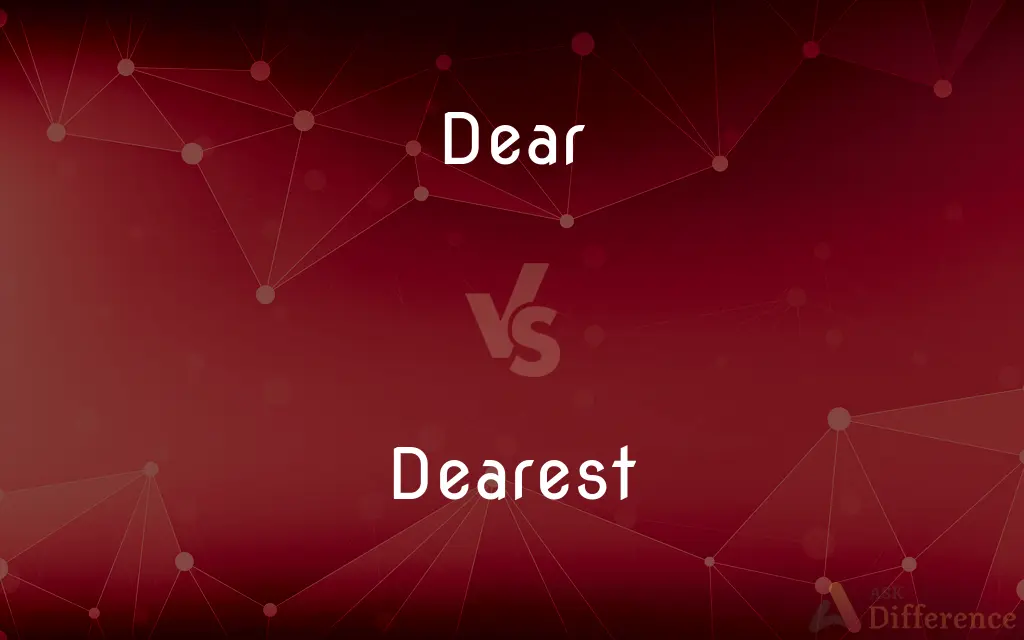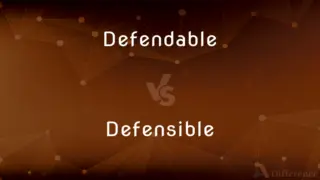Dear vs. Dearest — What's the Difference?
By Tayyaba Rehman — Updated on November 7, 2023
'Dear' is a term of affection or formality, while 'Dearest' intensifies the affection, suggesting someone is the most loved or cherished.

Difference Between Dear and Dearest
Table of Contents
ADVERTISEMENT
Key Differences
'Dear' and 'Dearest' are both terms of endearment, but 'Dear' can also be a polite term used to address someone in a letter or conversation. It conveys warmth and affection but maintains a level of casualness or formality depending on the context. For example, a letter might begin with "Dear Mr. Smith," indicating respect rather than intimacy.
On the other hand, 'Dearest' is a superlative form of 'Dear,' indicating a higher degree of affection or importance. It is reserved for those with whom one shares a close bond or deep personal relationship. 'Dearest' might be used to address a letter to a loved one, signifying a special or intimate connection, as in "My Dearest Mary."
While 'Dear' can refer to anyone valued or respected, 'Dearest' is exclusive and personal, used to refer to someone considered the most beloved. 'Dear' might be seen in professional contexts, still respectful but less intimate. For instance, "Dear Colleagues" is suitable for a work email.
In contrast, 'Dearest' would appear out of place in a professional setting due to its implication of a private or familial relationship. It is a term of great endearment and is often seen in historical or literary contexts, reflecting a depth of emotion and closeness, such as in old personal letters or romantic literature.
'Dear' can be synonymous with expensive or cherished when not addressing someone, indicating the value of an object or concept, while 'Dearest' as an adjective is almost exclusively used for people, not things. This highlights the nuanced usage of 'Dear' in various contexts compared to the more singular emotional focus of 'Dearest.'
ADVERTISEMENT
Comparison Chart
Degree of Affection
Shows affection or regard
Indicates highest affection
Usage Frequency
Common in daily use
Less common, more intimate
Relationship Context
Can be formal or personal
Suggests close personal ties
Formality Level
Formal or informal
Typically informal
Scope of Use
Broader, various contexts
Narrower, emotional context
Compare with Definitions
Dear
Highly valued
The family heirlooms were dear to him.
Dearest
Most beloved
You are my dearest friend.
Dear
Costly or expensive
That painting is very dear.
Dearest
Extremely loving
Her dearest embrace warmed him.
Dear
Regarded with deep affection
He is very dear to me
A dear friend
Dearest
Most cherished
He kept the dearest memories close to his heart.
Dear
Expensive
Five pounds—that's a bit dear!
Dearest
Most loved or cherished
One of my dearest friends
Dear
Used as an affectionate or friendly form of address
Don't you worry, dear
Dearest
Most expensive
Beer is dearest in Germany
Dear
At a high cost
They buy property cheaply and sell dear
Dearest
Used as an affectionate form of address
You make me so happy, dearest
Dear
Used in expressions of surprise, dismay, or sympathy
Oh dear, I've upset you
Dearest
Loved and cherished
My dearest friend.
Dear
Loved and cherished
My dearest friend.
Dearest
Greatly valued; precious
Lost everything dear to them.
Dear
Greatly valued; precious
Lost everything dear to them.
Dearest
Highly esteemed or regarded. Used in direct address, especially in salutations
Dear Lee Dawson.
Dear
Highly esteemed or regarded. Used in direct address, especially in salutations
Dear Lee Dawson.
Dearest
High-priced; expensive.
Dear
High-priced; expensive.
Dearest
Charging high prices.
Dear
Charging high prices.
Dearest
Earnest; ardent
"This good man was a dear lover and constant practicer of angling" (Izaak Walton).
Dear
Earnest; ardent
"This good man was a dear lover and constant practicer of angling" (Izaak Walton).
Dearest
(Obsolete) Noble; worthy.
Dear
(Obsolete) Noble; worthy.
Dearest
Heartfelt
It is my dearest wish.
Dear
Heartfelt
It is my dearest wish.
Dearest
Severe; grievous; sore
Our dearest need.
Dear
Severe; grievous; sore
Our dearest need.
Dearest
A person who is greatly loved. Often used as a form of address.
Dear
A person who is greatly loved. Often used as a form of address.
Dearest
An endearing, lovable, or kind person
What a dear she is!.
Dear
An endearing, lovable, or kind person
What a dear she is!.
Dearest
With fondness; affectionately.
Dear
With fondness; affectionately.
Dearest
At a high cost
Sold their wares dear.
Dear
At a high cost
Sold their wares dear.
Dearest
Used as a polite exclamation, chiefly of surprise or distress
Oh dear.
Dear me.
Dear
Used as a polite exclamation, chiefly of surprise or distress
Oh dear.
Dear me.
Dearest
A beloved person; a term of endearment.
Dear
(UK) High in price; expensive.
The dearer the jewel, the greater the love expressed.
Dearest
A beloved person; used as terms of endearment
Dear
Loved; lovable.
Dearest
A term of intimate address
Dearest, will you pass the salt?
Dear
Lovely; kind.
Dearest
Deeply heartfelt
In her dearest wish, she hoped for peace.
Dear
Loving, affectionate, heartfelt
Such dear embrace tenderly comforts even in this dear sorrow.
Dear
Precious to or greatly valued by someone.
The dearer the giver, the dearer the trinket he brings!
Dear
A formal way to start (possibly after my) addressing somebody at the beginning of a letter, memo etc.
Dear Sir/Madam/Miss, please notice our offices will be closed during the following bank holidays:nb....
Dear
A formal way to start (often after my) addressing somebody one likes or regards kindly.
My dear friend, I feel better as soon as you come sit beside my sickbed!
Dear
An ironic way to start (often after my) addressing an inferior.
My dear boy, if your grades don't pick up I won't bounce you on, but over my knee!
Dear
(obsolete) Noble.
Dear
Severe, or severely affected; sore.
Dear
(obsolete) Fierce.
The Christens found the heathens dear, as the lion doth the bear.
Dear
A very kind, loving person.
My little cousin is such a dear, always drawing me pictures.
Dear
A beloved person.
Dear
An affectionate, familiar term of address, such as used between husband and wife.
Pass me the salt, would you dear?
Dear
An elderly person, especially a woman.
Dear
(obsolete) To endear.
Dear
Dearly; at a high price.
Dear
(dated) Indicating surprise, pity, or disapproval.
Dear, dear! Whatever were they thinking?
Dear
Bearing a high price; high-priced; costly; expensive.
The cheapest of us is ten groats too dear.
Dear
Marked by scarcity or dearth, and exorbitance of price; as, a dear year.
Dear
Highly valued; greatly beloved; cherished; precious.
Neither count I my life dear unto myself.
And the last joy was dearer than the rest.
Dear as remember'd kisses after death.
Dear
Hence, close to the heart; heartfelt; present in mind; engaging the attention.
[I'll] leave you to attend him: some dear causeWill in concealment wrap me up awhile.
His dearest wish was to escape from the bustle and glitter of Whitehall.
Dear
Of disagreeable things and antipathies.
In our dear peril.
Would I had met my dearest foe in heavenOr ever I had seen that day.
Dear
A dear one; lover; sweetheart.
That kiss I carried from thee, dear.
Dear
Dearly; at a high price.
If thou attempt it, it will cost thee dear.
Dear
To endear.
Dear
A beloved person; used as terms of endearment
Dear
A sweet innocent mild-mannered person (especially a child)
Dear
Dearly loved
Dear
With or in a close or intimate relationship;
A good friend
My sisters and brothers are near and dear
Dear
Earnest;
One's dearest wish
Devout wishes for their success
Heartfelt condolences
Dear
Having a high price;
Costly jewelry
High-priced merchandise
Much too dear for my pocketbook
A pricey restaurant
Dear
With affection;
She loved him dearly
He treats her affectionately
Dear
At a great cost;
He paid dearly for the food
This cost him dear
Dear
Beloved or loved
She wrote a note to her dear friend.
Dear
Earnest or heartfelt
He gave a dear apology.
Dear
A polite address
Dear Sir or Madam, your attention is needed.
Common Curiosities
Can "Dear" be used for both males and females?
Yes, "Dear" is gender-neutral and can be used for any gender.
Can "Dear" be an adjective for something non-human?
Yes, "Dear" can describe something valuable or expensive.
Does "Dearest" imply a close relationship?
Yes, "Dearest" implies a close, intimate relationship.
Can "Dear" start both formal and informal letters?
Yes, "Dear" is suitable for starting both formal and informal letters.
Is "Dearest" appropriate in professional correspondence?
No, "Dearest" is too intimate for professional correspondence.
Is "Dearest" an appropriate salutation for a business email?
No, "Dearest" is too personal for a business email.
Does "Dear" have a plural form?
Yes, "Dear" can be pluralized as "Dears" when addressing a group.
Is "Dearest" appropriate for closing a letter to a loved one?
Yes, "Dearest" is a warm, affectionate closing for such a letter.
Can "Dear" be used sarcastically?
Yes, "Dear" can be used sarcastically in certain contexts.
Is "Dearest" used in modern communication?
"Dearest" is less common today but still used for affectionate communication.
Can the usage of "Dear" evolve over time in a relationship?
Yes, "Dear" can become more meaningful as a relationship deepens.
Should "Dearest" be reserved for romantic partners?
Not exclusively, but it is often used in a romantic context.
Can "Dearest" refer to the most cherished memory or item?
Typically, "Dearest" refers to people, not objects or memories.
How does tone affect the use of "Dear" in communication?
The tone can render "Dear" either sincere or formal, depending on context.
Can "Dear" precede a job title or role?
Yes, e.g., "Dear Professor Smith."
Share Your Discovery

Previous Comparison
Pioneer vs. Explorer
Next Comparison
Defendable vs. DefensibleAuthor Spotlight
Written by
Tayyaba RehmanTayyaba Rehman is a distinguished writer, currently serving as a primary contributor to askdifference.com. As a researcher in semantics and etymology, Tayyaba's passion for the complexity of languages and their distinctions has found a perfect home on the platform. Tayyaba delves into the intricacies of language, distinguishing between commonly confused words and phrases, thereby providing clarity for readers worldwide.
















































